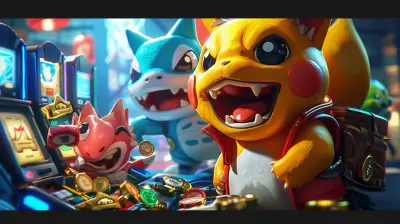Building a Community of Beta Testers from Your Crowdfunding Backers
3 June 2025
When it comes to launching a new game, getting honest feedback is the secret sauce for success. Whether you're an indie developer or part of a small studio, you probably already know how crucial beta testers can be during the development process. But have you ever thought about tapping into your crowdfunding backers as a potential goldmine of enthusiastic testers? These are the people who believed in your project enough to back it—they're already invested emotionally (and financially), so why not involve them further?
In this article, we’ll dive deep into how you can transform your crowdfunding backers into a tight-knit, loyal community of beta testers. Not only can this help you refine your game, but it can also elevate your relationship with those who supported you from day one.
Why Beta Testers Matter (And Why Your Backers Are Perfect for the Job)
Think of beta testing as stress-testing your hard work. It’s like taking your shiny new car for a test drive to work out any kinks before the big road trip. From spotting bugs to balancing gameplay mechanics, beta testers give you insights that your development team might miss.Now, here's the thing: your crowdfunding backers are already some of your most passionate fans. They’re emotionally invested in your game's success, which makes them the perfect candidates to help you make it better. Plus, involving them in this process helps you build trust and deepen their commitment to your project. It's a win-win.
But how do you go about building that community? Let’s break it down step by step.
Step 1: Start with a Plan
Before you rally the troops, you need a game plan. Ask yourself:1. What do I need from beta testers? Are you looking for detailed bug reports? Opinions on difficulty levels? Feedback on the storyline? Be specific.
2. How many testers do I need? A small group might be enough if you're fine-tuning gameplay mechanics. But for stress testing servers or multiplayer features, you'll need more hands on deck.
3. What tools will I use? Decide where feedback will be collected—will it be a survey, a dedicated forum, or a private Discord server?
Pro tip: Keep it simple and clear. You don’t want to overwhelm your backers with a complicated process. Think streamlined, like giving someone easy-to-follow instructions for IKEA furniture (minus the missing screws).
Step 2: Create an Exclusive Invitation
Here’s the deal: your backers will feel special if you frame this as an exclusive opportunity. You’re not just asking for help—you’re inviting them to be a part of the inner circle.Send out personalized emails to your backers, explaining what beta testing involves, why their input matters, and how they can participate. Use sentences like, “We couldn’t have gotten this far without you, so we’d love for you to help us make the game even more epic!” Flattery works wonders.
Make sure to include:
- A brief overview of the beta test schedule
- Details on how to sign up
- Any perks or incentives (more on this below)
Step 3: Set Up a Private Community Hub
Once you’ve got your beta testers on board, you need a central hub where they can communicate and share feedback. This could be a private Facebook group, a hidden subreddit, or even a Discord server. Discord is particularly great because it allows for real-time communication, and you can set up specific channels for bug reports, gameplay suggestions, or general chat.Think of this hub as the local coffee shop where everyone hangs out—it’s where relationships are built, ideas flow, and problems get solved. Encourage camaraderie by sparking conversations and being active yourself. If you’re MIA, your testers might lose interest or feel like their contributions aren’t valued.
Step 4: Incentivize Participation
While many backers will be excited to help for the sake of the project, a little motivation doesn’t hurt. Think about what you can offer as a thank-you:- Early access to the final game
- Exclusive in-game rewards like skins, weapons, or characters
- A shoutout in the credits (who doesn’t want to see their name up there?)
- Limited-edition physical rewards, like posters or stickers
These incentives don’t just reward their efforts; they reinforce the idea that they're part of something special. It's like giving a gold star to the student who went above and beyond on their homework.
Step 5: Collect Feedback Effectively
Gathering feedback is an art and a science. Your testers might be giving you random comments like, "The jumping feels off," or, "This boss is impossible." While this feedback is valuable, it's your job to guide them into providing more actionable insights.Here’s how to make it easy for them:
- Use structured forms or templates. Instead of asking vague questions like, “What did you think?”, ask specific ones like, “Did you encounter any bugs during combat? If so, describe them.”
- Be available. When testers have questions, respond quickly. This shows you care about their input.
- Encourage open communication. Some people might feel hesitant to give negative feedback, so reassure them that constructive criticism is welcome. Frame it as, “Help us make the game you’ve always dreamed of!”
Step 6: Keep Them in the Loop
Once the feedback starts rolling in, don't leave your testers hanging. Share updates on what changes you’re making as a result of their input. For instance, if 70% of testers said the first level was too hard, let them know you’ve tweaked the difficulty.This transparency builds trust and keeps your community engaged. Plus, it shows that you genuinely value their contributions. It’s like saying, “Hey, we hear you. Thanks for helping us make this awesome!”
Step 7: Gather Testimonials
Your beta testers' feedback can also double as marketing material. With their permission, use their glowing reviews, quotes, or enthusiastic reactions to promote your game.For example:
- Social media posts: “One of our beta testers just said, ‘This game has the most immersive story I’ve ever seen!’ We can’t wait to share it with the world!”
- Kickstarter updates: Highlight how their involvement has improved the game.
This not only hypes your upcoming release but also shows future backers that you’re committed to listening to your community.
Step 8: Celebrate the Community
When the game is finally ready to launch, don’t forget to celebrate your beta testers. Throw a virtual launch party, send out a heartfelt thank-you message, or create a small video montage recognizing their contributions. This extra mile solidifies a sense of belonging and keeps them rooting for your success long after the game is released.Remember, today’s beta tester could be tomorrow’s lifelong fan. Treat them well, and they'll go to bat for you when it matters most.
Common Mistakes to Avoid
While building a community of beta testers is rewarding, there are some pitfalls to watch out for:1. Overpromising and under-delivering: If you promise rewards or updates, stick to your word.
2. Ignoring feedback: If your testers feel like their input isn’t being taken seriously, they might disengage.
3. Burnout: Don’t overwork your testers. Respect their time and effort by keeping testing sessions manageable.
By avoiding these mistakes, you’ll foster a happier, more dedicated group.
Wrapping It Up
Building a community of beta testers from your crowdfunding backers isn’t just about improving your game; it’s about creating a loyal group of people who feel connected to your vision. By planning thoughtfully, fostering open communication, and rewarding their efforts, you can turn backers into lifelong supporters.Remember, it’s not just about the game—it’s about the people who believe in it. Treat your beta testers like the VIPs they are, and they’ll help you create something truly extraordinary.
all images in this post were generated using AI tools
Category:
CrowdfundingAuthor:

Lana Johnson
Discussion
rate this article
3 comments
Maxwell Bishop
Creating a community of beta testers from your crowdfunding backers is a brilliant way to foster genuine connections and loyalty. It's heartening to see developers valuing their supporters' input, turning backers into key players in the game's journey. This approach not only improves the game but also nurtures a sense of belonging.
June 19, 2025 at 3:36 PM

Lana Johnson
Thank you! I completely agree—engaging backers as beta testers not only enhances the game but also cultivates a stronger community and fosters loyalty.
Yazmin Franco
Oh sure, because nothing says “I love you” to your backers like turning them into your unofficial bug-finding army! Who needs professional testers when you can have eager fans squashing glitches for the thrill of it? Just remember, it's all in the name of community, right? Good luck!
June 3, 2025 at 2:59 PM

Lana Johnson
Thank you for your perspective! Engaging backers as beta testers can foster a strong community, and their feedback is invaluable in refining the project.
Mary Foster
Great article! It’s wonderful to see how crowdfunding backers can become an integral part of the testing process. Building a community fosters collaboration and helps create a better game. Excited to see how this approach benefits future projects!
June 3, 2025 at 3:25 AM

Lana Johnson
Thank you for your kind words! I agree—community involvement is key to creating better games. Excited for what’s ahead!



